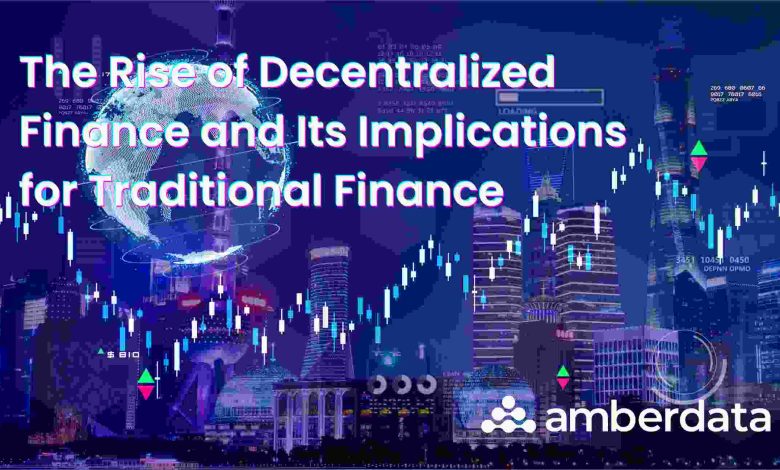The Rise of Decentralized Finance (DeFi)

- Understanding the Basics of Decentralized Finance (DeFi)
- The Evolution of Traditional Finance to Decentralized Finance
- Exploring the Benefits of Decentralized Finance (DeFi)
- Challenges and Risks in the World of DeFi
- The Role of Smart Contracts in Decentralized Finance
- The Future of DeFi: Trends and Innovations to Watch
Understanding the Basics of Decentralized Finance (DeFi)
Decentralized Finance (DeFi) is a rapidly growing sector within the cryptocurrency industry that aims to revolutionize traditional financial systems by leveraging blockchain technology. DeFi platforms allow users to access a wide range of financial services without the need for intermediaries such as banks or brokers.
One of the key principles of DeFi is the concept of decentralization, which means that these platforms operate on a peer-to-peer basis, with no central authority controlling the network. This not only increases transparency and security but also reduces the costs associated with traditional financial services.
Some of the most popular DeFi applications include decentralized exchanges (DEXs), lending platforms, and stablecoins. DEXs allow users to trade cryptocurrencies directly with one another, without the need for a centralized exchange. Lending platforms enable users to borrow and lend cryptocurrencies, while stablecoins are digital assets pegged to a stable asset such as the US dollar.
The Evolution of Traditional Finance to Decentralized Finance
Traditional finance has long been the dominant system for managing and exchanging assets, relying on centralized institutions such as banks and governments to facilitate transactions. However, with the rise of decentralized finance (DeFi), there has been a significant shift in how financial services are accessed and utilized.
DeFi leverages blockchain technology to create a more open and accessible financial system that operates without intermediaries. This evolution from traditional finance to DeFi has been driven by a desire for greater transparency, security, and efficiency in financial transactions.
One of the key differences between traditional finance and DeFi is the concept of decentralization. In traditional finance, transactions are processed and verified by centralized authorities, leading to potential issues such as censorship and single points of failure. In contrast, DeFi operates on decentralized networks, where transactions are verified by a network of users, eliminating the need for intermediaries.
Another important aspect of the evolution to DeFi is the concept of smart contracts. These self-executing contracts are coded to automatically enforce and execute the terms of an agreement when certain conditions are met. Smart contracts have revolutionized the way financial agreements are made, providing a more secure and efficient alternative to traditional contracts.
Overall, the evolution from traditional finance to DeFi represents a fundamental shift in how financial services are accessed and utilized. By leveraging blockchain technology, decentralization, and smart contracts, DeFi offers a more transparent, secure, and efficient alternative to traditional financial systems.
Exploring the Benefits of Decentralized Finance (DeFi)
Decentralized Finance (DeFi) offers a wide range of benefits that are revolutionizing the traditional financial system. By leveraging blockchain technology, DeFi provides users with greater control over their assets and financial transactions. One of the key advantages of DeFi is its ability to eliminate the need for intermediaries such as banks or financial institutions, allowing for direct peer-to-peer transactions.
Furthermore, DeFi platforms operate 24/7, enabling users to access financial services at any time without being restricted by traditional banking hours. This accessibility is particularly beneficial for individuals in underserved regions who may not have access to traditional banking services. Additionally, DeFi offers lower transaction fees compared to traditional financial services, making it a cost-effective option for users.
Another significant benefit of DeFi is its transparency and security. All transactions on DeFi platforms are recorded on the blockchain, providing an immutable and transparent ledger of all activities. This level of transparency helps to reduce the risk of fraud and ensures the integrity of the financial system. Moreover, DeFi platforms use smart contracts to automate processes, reducing the potential for human error and enhancing security.
Challenges and Risks in the World of DeFi
As with any emerging technology, the world of decentralized finance (DeFi) comes with its own set of challenges and risks that users need to be aware of. While DeFi offers exciting opportunities for financial inclusion and innovation, it also presents certain vulnerabilities that can be exploited by bad actors.
One of the main challenges in the DeFi space is the issue of security. Because DeFi platforms operate on blockchain technology, they are susceptible to smart contract bugs, hacks, and other vulnerabilities. This can result in the loss of funds for users who are not careful with their investments. It is crucial for users to conduct thorough research and due diligence before participating in any DeFi project to mitigate the risk of security breaches.
Another risk in the world of DeFi is the lack of regulation. Unlike traditional financial institutions, DeFi platforms are not subject to the same level of oversight and regulation. While this can lead to greater freedom and flexibility for users, it also means that there are fewer safeguards in place to protect against fraud and misconduct. Users should proceed with caution and be prepared to take full responsibility for their own financial decisions.
Furthermore, the fast-paced nature of the DeFi space means that new projects and protocols are constantly being introduced. While this can create exciting opportunities for users to explore, it also means that there is a higher likelihood of encountering scams and Ponzi schemes. It is important for users to exercise caution and skepticism when evaluating new DeFi projects, and to be wary of promises that seem too good to be true.
The Role of Smart Contracts in Decentralized Finance
Smart contracts play a crucial role in the realm of decentralized finance (DeFi). These self-executing contracts are coded to automatically enforce and facilitate the terms of an agreement when certain conditions are met. In the context of DeFi, smart contracts are utilized to create decentralized applications (dApps) that operate without the need for intermediaries.
One of the key advantages of smart contracts in DeFi is their ability to provide transparency and security. By being stored on a blockchain, smart contracts are immutable and tamper-proof, reducing the risk of fraud or manipulation. This transparency helps to build trust among users and eliminates the need for third-party oversight.
Moreover, smart contracts enable the automation of various financial processes, such as lending, borrowing, trading, and asset management. This automation not only increases efficiency but also reduces costs by eliminating the need for intermediaries. Users can interact directly with the smart contract, streamlining the process and reducing the time it takes to complete transactions.
Overall, smart contracts are revolutionizing the DeFi space by providing a secure, transparent, and efficient way to conduct financial transactions without relying on traditional financial institutions. As the DeFi ecosystem continues to grow, smart contracts will play an increasingly important role in shaping the future of finance.
The Future of DeFi: Trends and Innovations to Watch
The future of decentralized finance (DeFi) is filled with exciting trends and innovations that are shaping the landscape of the financial industry. As the popularity of DeFi continues to grow, it is important to keep an eye on the latest developments that are driving this sector forward.
- One trend to watch in the world of DeFi is the rise of decentralized exchanges (DEXs). These platforms allow users to trade cryptocurrencies directly with one another, without the need for a centralized intermediary. This trend is gaining momentum as more investors seek out alternatives to traditional exchanges.
- Another innovation to keep an eye on is the development of decentralized lending and borrowing platforms. These platforms allow users to lend out their cryptocurrencies to earn interest, or borrow assets by using their existing holdings as collateral. This trend is revolutionizing the way people access and manage their finances.
- Smart contract platforms are also a key innovation in the DeFi space. These platforms use self-executing contracts to automate transactions and enforce agreements without the need for intermediaries. This technology is enabling new financial products and services to be created in a decentralized manner.
- Furthermore, the integration of decentralized oracles is another trend that is gaining traction in the DeFi space. Oracles provide external data to smart contracts, enabling them to interact with the real world. This innovation is essential for DeFi applications that require accurate and timely information to function effectively.
Overall, the future of DeFi is bright, with a myriad of trends and innovations that are reshaping the financial industry. By staying informed and keeping up with the latest developments in the DeFi space, investors and users can take advantage of the opportunities that this exciting sector has to offer.



